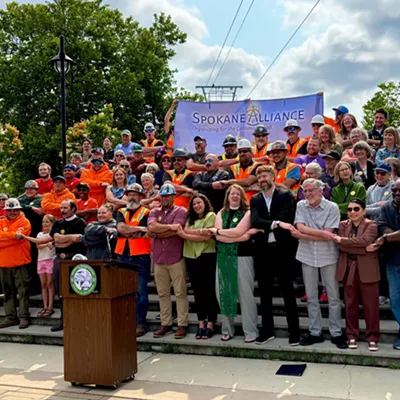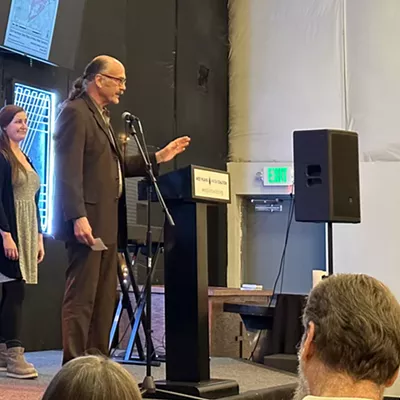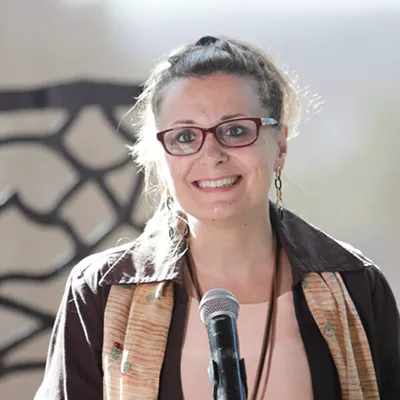A favorite local pastime around here is making fun of ourselves. Despite that fact, there are a few powerful people who refuse to play the game. In fact, local leaders are banding together to implement a new economic plan for the Inland Northwest. It will be fully unveiled next Thursday, June 12, during Spokane's fifth annual LaunchPad Event, sponsored by INTEC.
INTEC, founded in 2000, promotes technology and business in the Inland Northwest. With partners SIRTI and the Spokane Economic Development Council, INTEC has sponsored the creation of an economic dream model aimed at revitalizing and rethinking partnerships and collaboration.
The theory behind the model is based on an economic philosophy developed by professor Richard Florida. In his book, The Rise of the Creative Class, Florida shows, in short, how regions that attract and retain creative thinkers, innovators and financial risk-takers are the most successful. The Creative Class theory is widely respected and has become popular discourse for business leaders and strategists. This is the first time Spokane will see an economic model based on its ideas.
Lewis Rumpler, CEO of INTEC, plans to get leaders talking about the Innovation Economy at next week's LaunchPad event. Rumpler says implementing the Innovative Economy means thinking in new and novel ways.
"Economic development in the new age is understanding that communities don't have everything they need to compete," Rumpler says. "Assets are not all in one place. Basically, it's all about regions. If you're not thinking regionally, you're not thinking clearly."
The Innovation Economy is fueled by three essential "raw materials": innovation capital, investment capital and human capital.
"The Inland Northwest comprises 23 counties and has 943,000 people. In Spokane, we have the human capital, the available work force and the training capacity, but not necessarily the innovation. The Tri-Cities and Pullman/Moscow have the innovation capital -- the intellectual property," Rumpler says. Though he doesn't have examples of specific partnerships he'd like to see formed, he does discuss what collaboration will be necessary in the Innovation Economy.
"We need to implement some quantum strategies, both multi-institutional and multi-governmental," Rumpler explains. "The focus would be on [dissemination] of information, with more businesses formed and transferred into public commercialization. It can be done. The question is, How are we going to do it in our community?"
The Road to No. 1 -- That may be a good question for Kirk Watson, former mayor of Austin, Texas, and current member of the Richard Florida Creativity Group. Watson helped implement a Creative Class economy during his two terms in Austin, helping the city break away from a long history of business stalemates and establish itself as a great place to live and play. Austin is well known as the live-music capital of the country, and earlier this year the city was voted by Forbes magazine as the No. 1 place in America for business and careers. Watson will be presenting at the LaunchPad event in Spokane. He says he'll speak candidly about "What is the Creative Class, and what does that really mean? I'll try to move beyond the fancy buzzwords."
Watson adds that economic success depends largely on how well a region can market its unique attractions. He explains that a region's cultural and social climate, not just its financial standing, figures largely into its economic success -- now more than ever. In the worldwide economy, people have more choice about where they live.
"Literally, it's an economy that knows no borders or boundaries," Watson explains. "So where are [people] going to go? Where they have high quality of life. Where there is openness and diversity in terms of thought, a willingness to allow new ideas, new thinking."
All well put. But how, exactly, do we transform the culture of a region -- particularly a region known for being financially and socially conservative? There isn't a clear answer.
"It takes time for a community to figure out what its approach is going to be," Watson says. "What communities like Spokane will want to do is a couple-of-steps process. Step one is evaluate and identify those values, assets and natural gifts that it already has that can be used as a brand and built upon. Secondly, set forth clear goals."
Though Watson's recipe may sound simple, he's the first one to understand how truly complicated setting goals for a region, a population, even a city council for that matter, can be. Watson is a lawyer, a mediator and a public affairs consultant. He's had a long career smoothing over rough edges.
"Part of creativity sometimes assures conflict," Watson explains. "There is diversity in thought. Sometimes conflict can be a catalyst for movement." That's often how governments forge ahead, and Watson says that's why local political leaders will be of key importance.
"You have to define 'What is [government's] role in economic development?'" Watson says. "That is going to be a key component."
Rumpler believes the Innovation Economy will have to prove itself in order to crack some conservative shells.
"What you do is show that [the Innovation Economy] can be successful," he says firmly. "The folks who have been successful are wise to what good investments look like, and we'll give them a compelling investment thesis.
"My sense is that we will have a set of key stakeholders that will represent this model." Rumpler concludes. The stakeholders will be private-sector investors as well as business leaders and organizations, though he doesn't have specifics.
Spo-CAN! -- Describing what the Inland Northwest's Innovative Economy might look like in the future, Rumpler continues. "You'd see median household income comparable to Western Washington; you'd see that we'd have economic vitality. We'd have a larger amount of startup companies employing highly skilled individuals, more risk capital, more publicly trading companies; we'd have highly effective collaboration among private sectors, local government and universities; [we'd have] net integration, or more people coming than leaving. There'd be vibrant activity in terms of new business innovation."
In other words: a capitalist's Utopia. As local leaders network with other regional business leaders and rummage around for more regional branding material, and as the Innovative Economy is unveiled, Spokane County is struggling, as of April, with a 6.5 percent unemployment rate. One of every four children in Spokane County lives below the poverty level; half of Spokane's single mothers live in poverty.
In many ways, the Innovation Economy seeks to attract and retain diverse, successful people, but doesn't say much about those who are struggling to find work or raise a family on minimum wage. Hence some of the cynicism facing proponents of the Innovative Economy.
Rumpler says they should look deeper. "Here's the interesting thesis. It's not a question of solutions, but economy transformation is one of the best hopes for the work force we currently have," he says. "There is a multiplier effect: when you create a high-wage job there can be two, three or four other jobs created. We do have the capacity to educate and train. There is clearly a re-skilling component here. I still think it's a sound approach."
As for eradicating poverty, no economic model to date can do that. "A 30-year problem is not going to be solved in 30 days or 30 months," explains Rumpler, speaking theoretically. "We have to have patience."
Watson agrees. He says not only will it take time, but it's going to take failure, too. "There is value in failure. Be prepared to take risks that don't always work."
Many times, what we risk reveals what we value. Rumpler hopes the Innovation Economy will stir positive values -- and attitudes -- perhaps transforming that nagging sense of Spo-can't into Spo-can.
"If we look at the Inland Northwest relative to the world, we always seem to see ourselves as behind. And we may have adopted consciousness about ourselves that is less than we can be. I hope we can shift the culture to believing something quite different. We could be highly competitive, diverse -- an enabled region."
Publication date: 06/05/03














